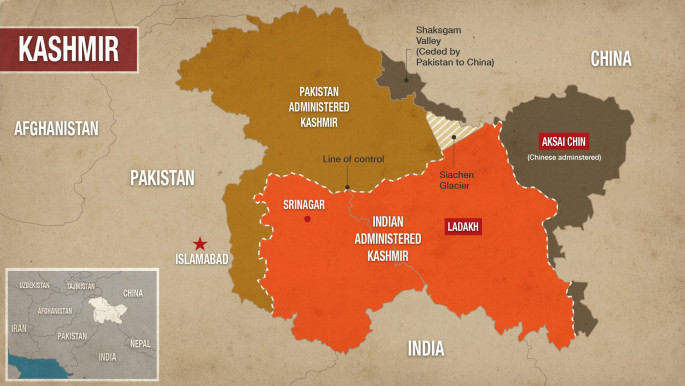
Modi doesn't deserve a medal, and UAE should know better
The Muslim majority territory has come under a renewed clampdown this month as the government of India controversially revoked the autonomous status given to the Indian-administered state of Jammu and Kashmir.
The move left 8 million Kashmiris living in an unprecedented lockdown while article 370 was stripped from them, leaving many citizens in total communication blackout and facing the prospect of an uncertain future.
Prime Minister Narendra Modi celebrated the revocation of the status, despite the clear evidence of human rights violations that have resulted in large scale unrest and heightened tensions between India and Pakistan.
But despite the plight of many Muslims in Kashmir, the UAE, Bahrain, and many other Muslim majority countries have chosen to remain silent on the matter.
In this context, the UAE's award to Modi - supposedly for boosting "bilateral relations between the two countries" - is absurd. The move shows no empathy or understanding for the current crisis between India and Pakistan, and an eye only for strategic economic-political gain.
 |
Many Muslim majority countries have chosen to remain silent on the matter |  |
In fact, many Muslim majority countries continue to maintain convenient alliances with powerful allies for the sake of economic gain, blithely ignorning the injustices inflicted upon their Muslim brothers and sisters.
Indeed, $100 billion of annual trade between Gulf countries and India is not reason to dismiss unprecedented human rights violations and the ill treatment of Muslims in Kashmir, or any other country, for that matter.
Kashmiri citizens have had to undergo a form of collective punishment during the recent lockdown, unable to contact anyone or meet their basic needs for food and clothing.
Human Rights Watch has reported that "restrictions on movement placed vulnerable people at risk, hindering access to crucial medical care and other services".
 |
|
For its part, the UN is concerned that security forces were carrying out night raids and arresting young people, stating that, "Such detentions could constitute serious human rights violations, the allegations must be thoroughly investigated by the authorities, and, if confirmed, those responsible must be held accountable".
In addition, the UN further stated that "independent experts also raised the alarm over excessive force against protesters, including the use of live ammunition, which could amount to violations of the right to life."
"India has the responsibility to use the minimum force necessary when policing protests," the experts concluded. The use of such harsh measures on peaceful protestors has resulted in many deaths and injuries causing further unrest in the territory.
In an unacceptable move, Indian police have detained 4,000 people in Kashmir under the controversial Public Safety Act, which can allow the government to detain people without charge for up to two years. Many young Kashmiris are at risk of being detained and under the guise of "security measures", with no way to contact their loved ones or access help.
 |
The UAE has been supportive of India, calling the decision to downgrade Kashmir's status an 'internal matter' |  |
Those protesting the change in law are subject to violent security forces, who have been indiscriminately deploying tear gas and pellet guns amid crowds of peaceful protestors.
The UAE, however, has been supportive of India, calling the decision to downgrade Kashmir's status an "internal matter", in a callous show of disinterest.
The human rights violations in Kashmir are deeply concerning and should not be taken lightly, nor should they be downplayed.
Accountability and justice must be sought immediately by the international community and human rights groups, to ensure that those who have suffered have their rights protected.
The Muslim nations of the world must stand together against the atrocities inflicted upon Kashmir and other countries where many Muslims are being persecuted in complete impunity.
The human rights of all Kashmiris must be upheld and respected. Regardless of oil money or trade deals, governments in the Arab world should set the bar high, and hold those who have inflicted harm on them to account through the eyes of the law.
Tasnim Nazeer is an award-winning journalist, author, and Universal Peace Federation Ambassador. She has written for Al Jazeera, The Guardian, The Huffington Post, Middle East Eye, CNN, BBC, and others. She was awarded the FIPP the global network of media Rising Stars in Media Award 2018.
Follow her on twitter: @tasnimnazeer1
Opinions expressed in this article remain those of the author and do not necessarily represent those of The New Arab, its editorial board or staff.





 Follow the Middle East's top stories in English at The New Arab on Google News
Follow the Middle East's top stories in English at The New Arab on Google News


